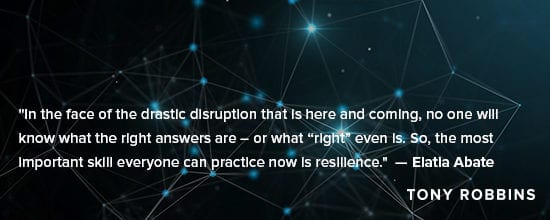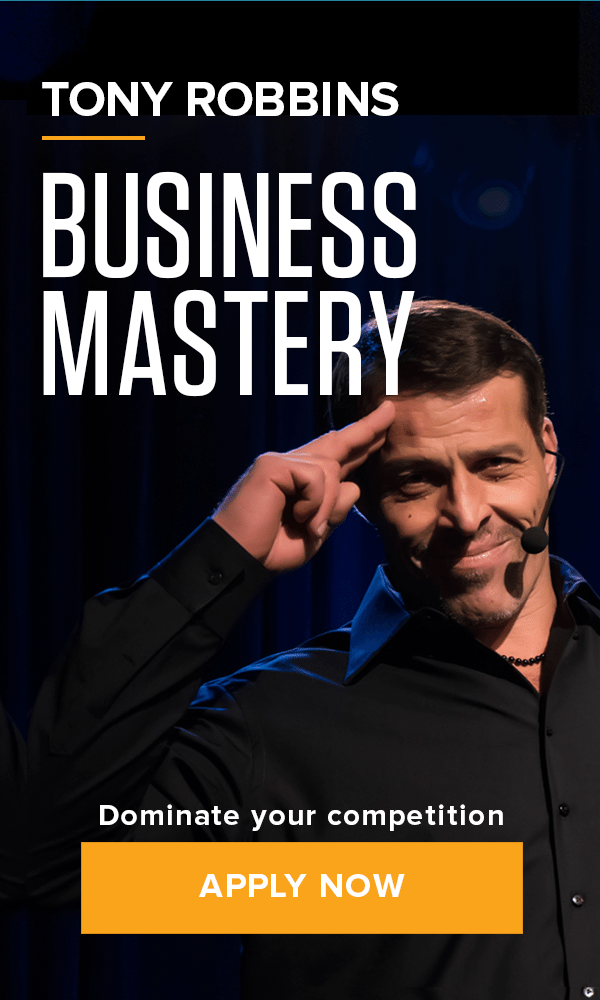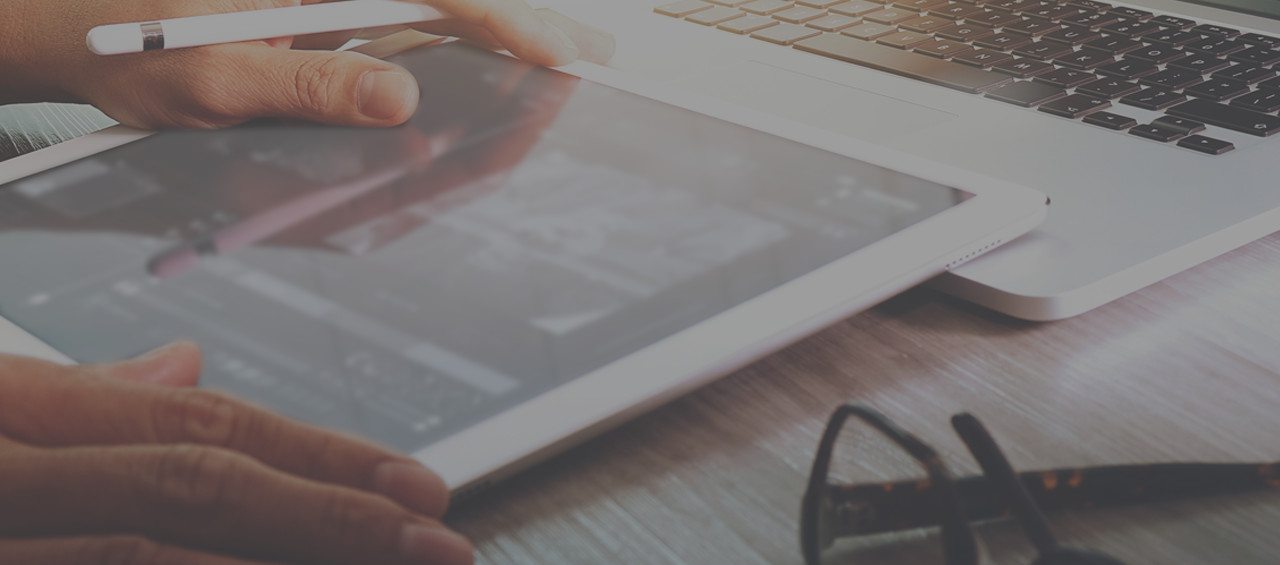Team Tony cultivates, curates and shares Tony Robbins’ stories and core principles, to help others achieve an extraordinary life.
How to be the disruptor, not the disrupted
The unbridled opportunities of the 4th industrial revolution
This article was contributed by entrepreneur and human capital expert Elatia Abate – see full bio below.
We are now in the fourth Industrial Revolution, traversing the next economic frontier. This is an age of convergence, with unprecedented technological advancements that are increasing human longevity, making internet available for all, melding human and artificial intelligence, and even colonizing Mars.
As X-Prize founder Peter Diamandis says, “It’s truly the most exciting time to be alive.” (I think Tony would agree!) But there is a flip side to this excitement and enthusiasm. Many people are uncertain and confused about how to channel this disruption into opportunity. And their confusion is well-founded; the rules of business, negotiation, collaboration and innovation have changed, so it’s unclear how to navigate this new world.
Fortunately, there is a simple framework that can guide all of us to not simply survive in the face of this disruption, but to lead the charge – and thrive.
WHAT’S CHANGING
So, what is happening, and why should you care? There is a “perfect storm” brewing that will dramatically affect (and is affecting) everyone on the planet – how we work, what work means, how we live, and how we find meaning in our lives.
TECHNOLOGY: AUTOMATION
The first factor is the direct impact of technology on work. In 2013, economists at Oxford University published a paper that predicts that 47% of jobs in the United States will be computerized or taken over by robots in the upcoming years.
This isn’t all doom and gloom because 65% of the jobs that will exist by the time today’s elementary school students enter the workforce haven’t even been created. What it does mean is that many of us will find ourselves needing to look for new jobs and/or redefine ourselves at work.
SHIFTING WORKFORCE DEMOGRAPHICS
The second factor is the shifting global workforce population. Of course, the baby boomers are retiring (or staying longer than their predecessors) and the millennials and Gen Z are entering and changing the workplace.
It is expected that in the next 5-7 years, 3 billion people who have never had access to the internet will be connected, and the entrepreneurial and educational opportunities it provides will be coming online.
What will competition look like then? Additionally, there is a massive trend toward freelance work. In the U.S., there are studies that predict that 50% of the population will be freelancing in the next decade. What happens when a job is no longer a job?
INEVITABLE ECONOMIC DOWNTURN
Finally, the economy. Tony wrote Unshakeable because he understands that economic upticks and downturns happen in cycles. At some point, there will be another economic crash.
If any one of these things were to happen on their own, disruption would occur. All of them together will create a tsunami of change never before experienced. This change can mean opportunity for all of us – if we understand how to navigate it.
The framework that can help us thrive in the face of all of this uncertainty is comprised of mindset, education, and collaboration. In short, understanding that we have agency over the choices we make regardless of the degree of disruption, and that above all else we need to practice and learn resilience. Finally, that the world is no longer about “I” or “me,” but “us” and “we.”
MINDSET
CAPTAIN VS. CAPTIVE
The most important mindset distinction is that we have choice and agency over how we decide to view the disruption. We can be captive to the circumstances, wishing that things would go back to the way they were – or the way we thought they were. Or, we can take the role of captains of our own destinies, and ask ourselves the critical question, “Given all of this (change/disruption/confusion), what do I want to create?” and then set about the business of creating that.
I graduated from business school in 2008 in the midst of the last major global financial crisis. Many of my classmates who had planned to work at investment banks after school, and thought their next few years were neatly planned, had their offers rescinded just a few weeks before graduation. People were scrambling and scared.
Those who were able to recognize that the old offers weren’t coming back and that they needed to create new opportunities in a turbulent reality fared much better both emotionally and with their reallocations than the ones who lamented the changes, but didn’t do much more.
EDUCATION
RIGHT V. RESILIENT
So much of how we are taught to learn and how we need to be in the world focuses on being “right.” The vast majority of our exams, papers, grading structures and work environments reward us with grades, praise and bonuses for being subject matter experts. Subsequently, most of us walk around avoiding mistakes and feeling like we need to know everything.
In the face of the drastic disruption that is here and coming, no one will know what the right answers are – or what “right” even is. So, the most important skill everyone can practice now is resilience.
Go out into the world with a goal of hearing “no” fifty times this week. (By the way, if you’re always hearing “yes,” you probably aren’t making big enough requests.) Try something you’ve never done before. Walk home a different way. Essentially, get your brain working on experiencing the unknown.

COLLABORATION
SCARCITY V. ABUNDANCE
Business of the past was rooted in scarcity. It was a fixed pie model. The understanding was that there was a limited quantity of resources and of market share. This was a zero-sum game. If I am winning, you are losing, and vice versa.
The results of this have been that when we negotiate, when we create, when we think strategically, we think about how we can maximize what we get, which means minimizing what the other party gets – which is very “I” or “me” focused.
The business models of the future are rooted in abundance, and the idea that everybody wins. The more any individual or company improves themselves through education, new products, etc., and then contributes that value to the whole, the more value everybody benefits. Negotiations don’t close on compromise, they close when everyone walks away from the table with what they need. This approach is more “us” or “we” focused.
For illustration, you can observe this difference in how Coca-Cola and Tesla manage their patents. Coca-Cola’s formula has been closely guarded for over a century. In contrast, in 2014, Tesla opened up all of its patents for use, in good faith, by anyone. It recognizes that the technologies it holds under patent are going to useful to help solve larger global challenges. By releasing the patents, everyone can win.
The future described here isn’t some far-off occurrence that will happen one day. It is already here. This framework will help you thrive, no matter the size of the disruption.
About Elatia Abate
Elatia Abate is an entrepreneur, human capital expert and thought leader on the topic of the future of work. Having devoted her life to creating solutions to the future of work its global challenges, she consults with companies, governments and educational institutions to create pathways to economic empowerment in the face of the disruption that technology creates in our world. She currently serves as a Partner and Futurist in Residence with FESA Group Miami, an executive search and human capital consulting firm headquartered out of Sao Paulo, Brazil.




